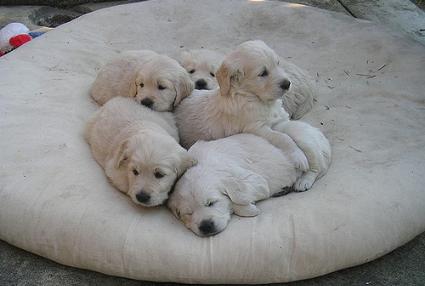Choosing A Puppy
Follow These Steps When Choosing Your Puppy
So you're ready to take the plunge, you've decided to bring a little puppy into your life.
That's great, but you've still got some important decisions to get right before you select your new housemate.
It's very tempting to simply pick out any of the cute little pups that bound up to you as you visit your puppy breeder. But take your time, do some research and look a little deeper. Choosing a puppy is an important long term decision, why not do everything you can to get it right?
The 8 week mark is the ideal time to pick your puppy up from the breeder. Before this time your puppy needs to be with his/her mother and siblings for his development and socialization.
[google_ad:DOTR_CMS_468x60_InArticle1]

General Considerations When Choosing A Puppy
- Choosing a well respected and reputable puppy breeder is a critical step towards purchasing a great lifelong companion. Good breeders breed wonderful, hardy specimens of their chosen breed and will never intentionally sell you a poor specimen.
- Test drive some adult dogs of the breed you have decided on. Talk to numerous owners and breeders at dog shows and local dog obedience training schools. Spend some time with the dogs and ask questions to the dog handlers. You'll gain plenty of useful, first hand knowledge of the breed by doing this.
- Put a phone call through to your local Veterinarian to find out if they have any thoughts about the breed, or know of any problems you should look out for.
- When you have identified a few breeders and are ready to check out a litter of puppies get someone experienced to go with you for guidance. Why not utilize someone else's experience and expertise in this important selection process?
- Do some research to determine if there are any breed specific ailments you need to be aware of. Certain breeds are prone to various genetic physical and mental problems such as cleft palate, blindness, deafness and hip dysplasia.
- Chatting with one or more dog obedience training instructors can give you a valuable insight into almost any dog breed. These people are usually a goldmine of unbiased information - you've just got to coax it out of them!

How To Find A Good Puppy Breeder
- A good place to locate a good breeder is by contacting your local Kennel Club or Association (Labrador Association of... Beagle Association of...).
- Overall appearance and cleanliness of the property/kennel is an obvious giveaway when visiting breeders. If the breeder can't get this basic necessity right, simply turn around and continue your search elsewhere.
- Are the breeder's older dogs healthy, well behaved and friendly? Once again this is a giveaway into the type of people you are dealing with.
- Is there a waiting list to purchase puppies from this breeder? Good breeders are always popular and it's a good sign if people are prepared to wait in line for their puppies.
- Are the pups raised indoors with plenty of human interaction right from the start? Your breeder performs the all important role of beginning the puppy socialization process, house training and some basic obedience training, all well before you will be able to take the puppy home.
- Have a good look at the mother (dam) and father (if possible) of the puppies before you choose one out. Check the parents over and ask questions to the breeder, they shouldn't have anything to hide. If possible even look at the grandparents of the puppies. The pedigree of your puppy will provide you with the best insight into what your puppy will grow to be.
- Ask how often the puppies are handled and also how many strangers they have been exposed to. The more people they meet early on the better. The pups should also be very comfortable with being handled by people of all shapes and sizes.
- Ask all kinds of questions - don't hold back. A good breeder will be happy for you to ask just about anything. Ask about the puppies food requirements, where they are at in the socialization process and anything else you can think of.
- Will the breeder allow you to return the pup if for any reason it doesn't work out?
- If you are still a little undecided or tossing up between a couple of different breeders you may choose to talk to some previous clients of the breeder. Put in a quick phone call to determine their satisfaction with the breeder. Good puppy breeders have nothing to hide and won't mind if you ask for a few references.
- Put your trust in a good breeder when choosing a dog, they will have your best interests at heart. Listen and take on board their advice and recommendations.
- Make sure the breeder will provide you with basic instructions regarding your puppy. Things like health care advice (vaccinations, worming), feeding schedule information and also ongoing support should be offered.
- Also puppy registration papers should be provided outlining the pedigree, whelping date, vaccination record and other details of your puppy.
- Enquire about the reason for this litter of puppies, was it planned? Have this pair been mated in the past?
Choosing Your Puppy - The Selection Process
- At first, observe the litter without disturbing them. Look out for things like how the pups interact with each other. An active, playful pup is very desirable, but not one that is dominant or overbearing with his/her litter-mates.
- Do a general visual health check of each puppy. They should be nice and round - not fat, and certainly not skinny. Even Greyhounds and Whippets are round little beasts until they are about four months of age.
- Look for a confident little pup who struts up to you and your family with head held high and tail wagging with excitement. A bit of a cheeky lick on the hand is also ok.
- Have a close look at the pups eyes, ears, gums, teeth and rear end. You want to see bright eyes, a shiny and clean coat, and no sign of any discharge or debris.

- Be wary of a shy and fearful pup when choosing a puppy. Pups at the 7-8 week stage shouldn't show any sign of these undesirable traits.
Many people end up selecting a puppy such as this because they feel sorry for them. Don't fall into this trap - it is not a valid reason for picking out a puppy!. It's no good for anyone and you will most likely regret your decision for many years to come.
- When you have identified one or two puppies that you like the look of, conduct a bit of a hearing test. With the puppy facing the other way or possibly playing with another member of your family drop a set of keys on the ground or stamp your feet.
The puppy should react immediately, even be a little startled by the noise and then ideally he/she will come over to investigate the commotion. It's very difficult to pick a deaf puppy out of a litter, if the pups are all together in the same pen.
- It's important that the puppy you end up choosing has energy levels which are compatible with you and your family's lifestyle. These energy levels will vary a great deal even in the one litter. After spending some time with the puppies you can make a judgment yourself, or the breeder will give you some insight.
- Pick the puppy up, hug him and cradle him. This is a bit of a test, if he reacts by squealing and wriggling and doesn't settle down, this is not a good sign. You may experience problems with a puppy such as this. A little struggle is ok, followed by quickly settling down and peering back up at you.
- Touch the puppies all over their bodies including paws, mouth and ears to monitor the reaction. A puppy who has been handled from an early age won't have any problem with you doing this.
- Many pure bred dogs have breed specific ailments which can cause problems. Check the puppies parents and even grandparents for any sign of breed specific problems. Also check if the pups have been screened for them (if appropriate). This step can save you a whole lot of heartache in the future.
- Many larger breeds such as German Shepherds, Labradors and Rottweilers can suffer from hip dysplasia. Check out the family history if you are searching for a puppy susceptible to hip dysplasia.
- Check the Vet records of your puppy including vaccination and worming record.
- Once you've made the big decision and have your heart set on a puppy it is advisable to have your Veterinarian do a thorough examination of the pup.
Choosing a puppy is an important step towards ensuring you end up with a healthy, well adjusted and happy long term companion.
Once you bring your puppy home it is then your responsibility to provide proper socialization and obedience training. This will shape the temperament and behavior habits of your puppy and set him up to thrive in society.
Good luck - I hope you find you and your family a great puppy!
Please consult the services of a Professional Dog Trainer, Behaviorist or Veterinarian before implementing any of the advice contained on this site.











 Your Privacy Choices
Your Privacy Choices